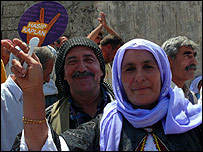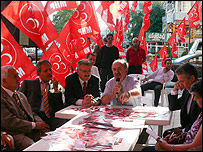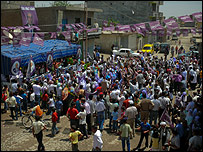
Monday, 16 July 2007
A convoy of cars snakes its way through a wheat field. Crammed inside are hundreds of mourners heading for the wake of the latest person to die in more than 20 years of conflict.

At the end of the dusty track, a group of wailing women greet the cars. Some wave photographs of the dead girl. She is dressed in military fatigues.
Rojda died fighting for the Kurdish separatist group PKK. To the Turkish state she was a terrorist. But the Turkish Kurds at her wake hailed her as a martyr.
"She went to fight against the enemy and against oppression," Rojda's sister says. "She couldn't take it any more."
Turkey has been fighting the separatist PKK in the south-east since 1984. The fighting subsided when its founder Abdullah Ocalan was captured 15 years later but has flared-up again recently with renewed force.
Revenge
More than 60 soldiers have died so far this year and Turkey insists it will carry on fighting until the last separatist is killed.
There seems little sign of that happening soon. The military says there are still around 2,000 PKK fighters in Turkey alone, and as many as 3,000 more based across the border in northern Iraq.

"After so many years of conflict, every Kurd here knows someone who has died or is up fighting in the mountains," one local man told me, observing the wake from the sidelines.
"Every time one PKK fighter is killed, another takes up a gun and goes to fight. The families of Turkish soldiers want revenge too. It can't go on like this."
So pro-Kurdish politicians are launching a peaceful offensive. They are out coaxing people to look to them for answers, not to the gun.
In the next town of Idil, a group of men crowd around Hasip Kaplan on a cobble-stoned side-street.
He is one of several dozen pro-Kurdish candidates campaigning for seat in the next parliament. They are demanding recognition and rights as ethnic Kurds, but want to prove that this does not make them separatists.
For many years even the term "Kurd" was banned here. There have been unprecedented reforms and improvement in recent years - but that mentality still lingers.
Regular clashes
At the last election Hasip Kaplan's party won almost 50% of the vote in the south-east where ethnic Kurds are in the majority. But the party could never attract enough support nationally to pass the high threshold to enter parliament.
So this time Kaplan and his colleagues will stand as independents - a strategic move they hope could win them as many as 30 seats.

"The Kurdish problem has always been treated as a security issue and handed to the military," Hasip Kaplan says, fiddling with a string of worry-beads.
"The Kurds are still discriminated against here because of their language and their race. The problem is social, political and psychological. It has to be addressed in parliament."
But that view finds little support outside the region.
Since spring there have been regular clashes between the PKK and Turkish troops in the mountains close to Idil.
Earlier this year 10 people were killed in Ankara in a suicide bomb attack blamed on the PKK.
Frustrated, the military is now calling for a major operation into Northern Iraq to target the Kurdish fighters it says are based there.
Unitary state
It is hardly an atmosphere conducive to dialogue. Instead, it is handing votes to Turkish nationalists, who have made security a major campaign issue.
More than 1,000km (621 miles) from Idil, a local Istanbul office of the nationalist MHP is draped in red and white national flags.
Supporters of the party are deeply suspicious of anyone who insists upon an individual Kurdish identity, and talks of Kurdish rights.
"Turkey was founded as a unitary state and you cannot change that. We have invested in this state materially and emotionally," says Gunduz Aktan, former ambassador turned MHP candidate for parliament.
"The Kurdish candidates are just a front organisation. The PKK murdered many innocent civilians. I don't want to sit under the roof of parliament with those who support terror."
But that is what he may soon have to get used to.
Pro-Kurdish politicians will not condemn the PKK, and with support from the south-east, they are likely to make it into parliament.
It may be an opportunity to talk peace. But it will not be easy.


